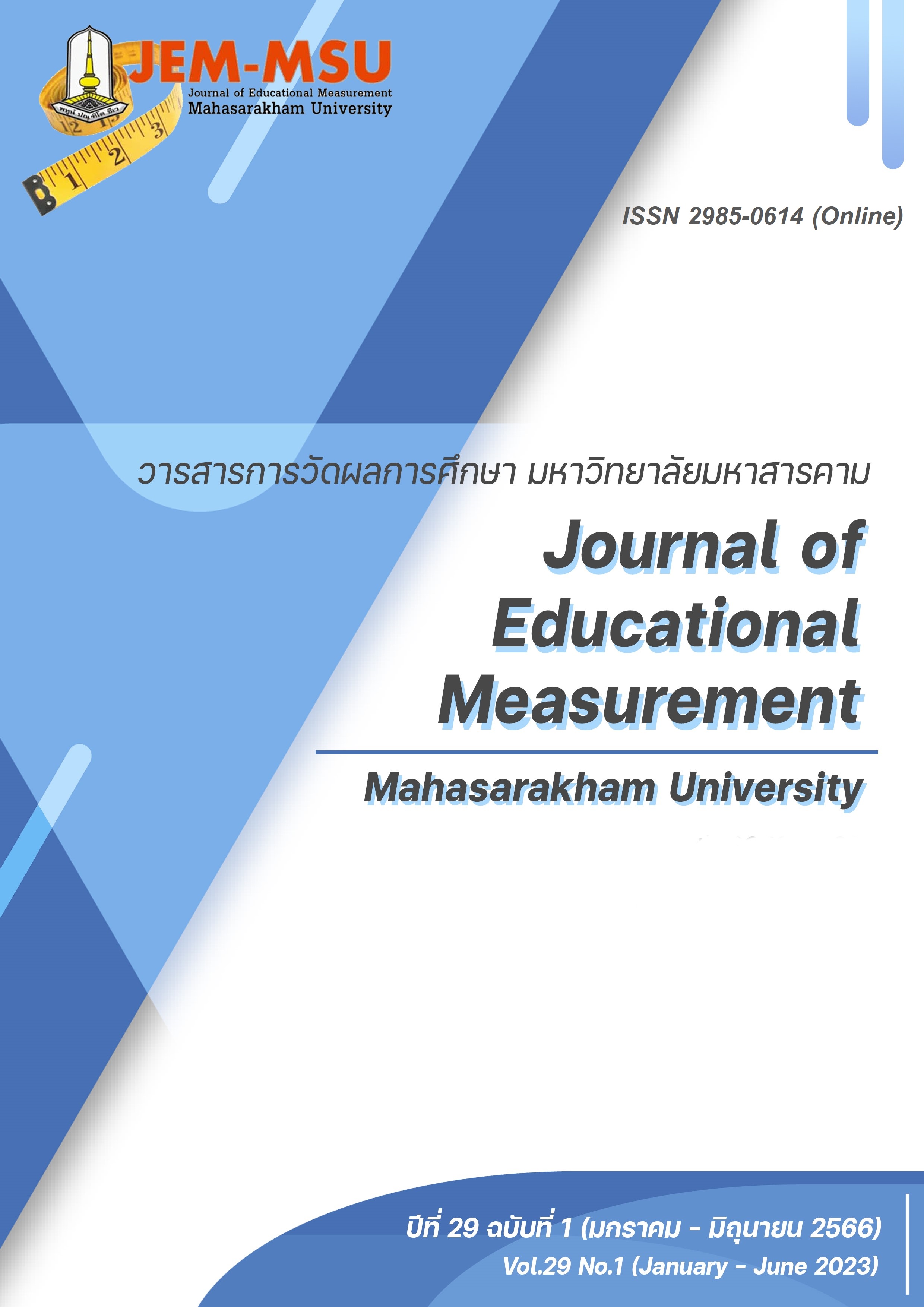School Management Strategy to Develop Students' Life Skills According to the Philosophy of Sufficiency Economy by Using the Professional Learning Community Process of Schools under the Office of Udon Thani Primary Education Service Area 2
Main Article Content
Abstract
The objectives of this research were: 1) to study the current condition, desirable condition and needs of school management to develop students' life skills according to the Philosophy of Sufficiency Economy by using the professional learning community process, for the schools under the Office of Udon Thani Primary Education Service Area 2. The sample consisted of 178 administrators and academic head teachers, obtained through stratified random sampling; 2) to set strategies, having 9 informants; 3) to verify appropriateness of the strategies, having 9 experts, selected through purposive sampling.The tools used for data collection comprised 2 questionnaires, having the validity from 0.80 to 1.00. One questionnaire was for the current condition, with the reliability of 0.97. The other was for the desirable condition, with the reliability of 0.98. The tools also included an interview form, a focus group discussion record, and a strategy assessment form, having the validity from 0.80 to 1.00. For the suitability aspect, the reliability was 0.95. For the possibility, the reliability was 0.97. The analysis of data employed descriptive statistics: frequency distribution, percentage, mean, standard deviation. The analysis of priorities of the needs employed the PNI Modified.
The results were as follows:
1. The current condition of school management to develop students' life skills according to the Philosophy of Sufficiency Economy by using the professional learning community process, on the whole, was at the moderate level. The overall desirable condition was at the high level. The needs in setting strategies were arranged in the following order: school administration according to the Philosophy of Sufficiency Economy, educational institution’s personnel development, curriculum for developing students' life skills according to the Philosophy of Sufficiency Economy, activities to develop students' life skills according to the Philosophy of Sufficiency Economy, and success, respectively.
2. The four strategies set for school management consisted of 4 main strategies as follows: 1) strategy for developing academic ability, 2) strategy for applying local wisdom,
3) strategy for integrating learning resources inside and outside the school, and 4) strategy for enhancing experiences.
3. The strategy evaluation results revealed that the suitability and possibility, on the whole, were at the high level.
Article Details

This work is licensed under a Creative Commons Attribution-NonCommercial-NoDerivatives 4.0 International License.
The content and information contained in the published article in the Journal of Educational Measurement Mahasarakham University represent the opinions and responsibilities of the authors directly. The editorial board of the journal is not necessarily in agreement with or responsible for any of the content.
The articles, data, content, images, etc. that have been published in the Journal of Educational Measurement Mahasarakham University are copyrighted by the journal. If any individual or organization wishes to reproduce or perform any actions involving the entirety or any part of the content, they must obtain written permission from the Journal of Educational Measurement Mahasarakham University.
References
Brian, F. (2002). Strategic Management for School Development. London: Chapman Publishing.
Koontz, H., & Weihrich, H. (1990). Essentials of Management. McGraw-Hill.
The United Nations Educational, Scientific and Cultural Organization. (2005). Contributing to More Sustainable Future: Quality Education, Life Skills and Education for sustainable Development. Division for the Promotion of Quality Education.
Wheelen, T. L., & Hunger, J. D. (2012). Strategic Management and Business Policy. Pearson Prentice Hall.
World Health Organization. (1997). Life skills education for children and adolescents in schools. World Health Organization.
Boontan, T. (2019). Developing Guidelines for Administration of the Philosophy of Sufficiency Economy (Local Sufficiency School) for Municipal Schools in the Provincial Group of Education 12 [Master’s thesis]. Mahasarakham Universiry. (in Thai)
Chutrirat, P. (2018). Development of a Program to Strengthen Teachers’ Learning Management Focusing on Sufficiency Economy Integration in the Department of Social Studies, Religion and Culture for Schools under the Jurisdiction of the Secondary Educational Service Area Office 25 [Master’s thesis]. Mahasarakham Universiry. (in Thai)
Kaniam, D. (2018). Management Strategy for Boarding Schools Based on the 21st [Doctoral dissertation]. Chulalongkorn University. (in Thai)
Kitrongreuuang, P., & Sirisampan, O. (2017). Proactive Learning Management Strategy To Develop Thinking and Enhance the Quality of Education for the 21st Century. (12nd Ed.). Petchkasem Printing Group Press. (in Thai)
Ministry of Education. (2005). Active Learning. Ministry of Education. (in Thai)
Ministry of Education. (2009). Basic Education Core Curriculum 2008. Teachers' council of Ladprao Press. (in Thai)
Office for National Education Standards and Quality Assessment. (2009). Second round of external quality assessment situation proposed to the Commission on Higher Education. Education Standards and Quality Assessment. (in Thai)
Office of the Basic Education Commission. (2002). National Education Plan 2002-2016. Prigwhan Graphic Press. (in Thai)
Office of the Basic Education Commission. (2004). Learn Integrate. Teachers' council of Ladprao Press. (in Thai)
Sanitklang, D. (2018). Secondary School Management Strategies According to the Concept of Developing Transcendental Leadership in Student [Doctoral dissertation]. Chulalongkorn University. (in Thai)
Sinlarat, P. (2007). The transition of education to the knowledge economy era Research Papers Included: Sila for Transition Education. Chulalongkorn University. (in Thai)
Siribanpitak, P. (2009). Administration and Management of Education for a Small World. Prigwhan Graphic Press. (in Thai)
Tanapatyotin, K. (2021). The Development of Strategic SBM Model Management School under Department of Local Administration [Doctoral dissertation]. Mahasarakham Universiry. (in Thai)
The Primary Educational Service Area Office Udon Thani 2. (2020). Government action plan for the fiscal year 2021. The Primary Educational Service Area Office Udon Thani 2. (in Thai)
Thovicha, S. (2019). Development of administrative strategy for High Performance Schools under Secondary Educational Service Area Office. [Doctoral dissertation]. Valaya Alongkorn Rajabhat University. (in Thai)
Thummatasananon, S. (2019). Development of models for Curriculum Management and for Organizing Learning Activities According to the Philosophy of Sufficiency Economy for Schools under the Office of the Secondary Education Service Area 25. Journal of Educational Measurement Mahasarakham University, 25(2), 225-269. (in Thai)


